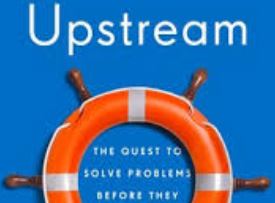
Residential aged care is predominantly stuck in a cycle of response. Solving one problem after another efficiently and effectively, but not fixing the systems that caused the problems. Well-intentioned efforts skewed heavily toward reaction rather than prevention.
We have a tendency to favour reaction. Its easier to see. Easier to measure. These downstream efforts are narrow and fast and tangible.
Is it possible to systematically reduce the harm caused by those downstream problems or even prevent problems before they happen? That is the question Dan Heath asks in his book Upstream: The quest to solve problems before they happen.
NQIQ are looking upstream – by shifting the focus in residential aged care to nutritional care.
Currently there is a requirement to measure incidents such as weight loss, falls, wounds & infections, hospitalisations, etc. Available and emerging solutions include an increasing variety of supplement tastes and flavours, falls detection technology, GPS trackers, mobility aids, ground breaking medication and dressings, smart alerts.
These focus on events that have already happened.
By alerting Clinical Managers to residents who are not receiving their adequate daily NQ (Nutritional Quotient) allows opportunity for action before weight loss and frailty that can increase the likelihood of measurable incidents. Nutrition actively managed on a daily basis is good for residents and staff.
Heath points out in his book Upstream the reality is that we can intervene at many points along an almost limitless timeline. In other words, you don’t head Upstream, as in a specific destination. You head upstream, as in a direction. Managing nutrition for elders in the community is further upstream than a Nutritional Quotient alert in residential care. Community education and focus on healthy diet and lifestyle is further upstream than effective medical treatment. There’s always a way to push further upstream—at the cost of more complexity.
Upstream efforts are broader, slower, and hazier — but when they work, they really work. They can accomplish massive and long-lasting good.
For now, NQIQ are moving a little upstream to improve nutritional care in residential aged care.
How many problems in aged care and in society are we tolerating simply because we’ve forgotten that we can fix them? Read the book Upstream for some encouraging examples.
